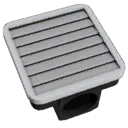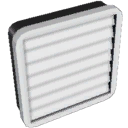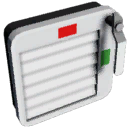Difference between revisions of "Passive Vent"
From Unofficial Stationeers Wiki
Socramazibi (talk | contribs) |
(Add paintable property) |
||
| (13 intermediate revisions by 9 users not shown) | |||
| Line 1: | Line 1: | ||
| + | <languages /> | ||
| + | <translate> | ||
{{Itembox | {{Itembox | ||
| − | | name | + | | name = Kit (Passive Vent) |
| − | | image | + | | image = [[File:ItemPassiveVent.png]] |
| − | | stacks = | + | | stacks = 5 |
| + | | recipe_machine1 = Hydraulic Pipe Bender | ||
| + | | recipe_cost1 = 3g [[Ingot (Iron)|Iron]] | ||
| + | | volume = 100L | ||
| + | | prefabhash = 238631271 | ||
| + | | prefabname = ItemPassiveVent | ||
| + | | paintable = Yes | ||
| + | }} | ||
| + | {{Structurebox | ||
| + | | name = Passive Vent | ||
| + | | image = [[File:StructurePassiveVent.png|Passive Vent]] | ||
| + | | prefab_hash = 335498166 | ||
| + | | prefab_name = StructurePassiveVent | ||
| + | | paintable = Yes | ||
| + | | placed_with_item = [[Kit (Passive Vent)]] | ||
| + | | placed_on_grid = Dynamic | ||
| + | | decon_with_tool1 = [[Wrench]] | ||
| + | | item_rec1 = [[Kit (Passive Vent)]] | ||
| + | }} | ||
| + | {{Structurebox | ||
| + | | name = Passive Vent (Passthrough) | ||
| + | | image = [[File:StructureWallVent.png|Passive Vent (Passthrough)]] | ||
| + | | prefab_hash = -1177469307 | ||
| + | | prefab_name = StructureWallVent | ||
| + | | paintable = Yes | ||
| + | | placed_with_item = [[Kit (Passive Vent)]] | ||
| + | | placed_on_grid = Dynamic | ||
| + | | decon_with_tool1 = [[Wrench]] | ||
| + | | item_rec1 = [[Kit (Passive Vent)]] | ||
| + | }} | ||
| + | {{Structurebox | ||
| + | | name = Passive Vent (Valve) | ||
| + | | image = [[File:StructurePassiveVentValve.png|Passive Vent (Valve)]] | ||
| + | | prefab_hash = -75599100 | ||
| + | | prefab_name = StructurePassiveVentValve | ||
| + | | paintable = Yes | ||
| + | | placed_with_item = [[Kit (Passive Vent)]] | ||
| + | | placed_on_grid = Dynamic | ||
| + | | decon_with_tool1 = [[Wrench]] | ||
| + | | item_rec1 = [[Kit (Passive Vent)]] | ||
}} | }} | ||
| + | == Description == <!--T:1--> | ||
| + | {{Quote|This kit creates a Passive Vent among other variants.|Stationpedia}} | ||
| + | |||
| + | Permits gasses to go through when connected to a pipe network. | ||
| + | |||
| + | You can think of a passive vent as removing the end cap of a pipe system. A pipe on its own - even if it visually looks different! - is always closed on both ends (unless devices are attached to the end of the pipe). So there will be no exchange of gases between the pipe and the surrounding environment. Heat may be exchanged, but no gasses! | ||
| + | |||
| + | If you place a passive vent on the end of a pipe, the pipe and the surrounding environment will basically become one and the same "system". That means the gas mixture in the pipe and the surrounding environment will instantly(!) average out (which may affect the pressure, temperature and mixture of both the pipe and the surrounding environment) and will always be identical after that initial "evening out". | ||
| + | |||
| + | There is no other active component needed for this "evening out" between the pipe and the surrounding environment to happen; the passive vent does this on its own. | ||
| + | |||
| + | But there will be no gas exchange beyond this "evening out". So if you, e.g. want to transport gas from a room through a passive vent and its attached pipe system to somewhere else, you need an active component - like an active vent, a pump or filtration unit, etc. - somewhere along the pipe. | ||
| − | + | Consider the smaller [[Pipe Cowl]] as an alternative. | |
| − | |||
| − | |||
</translate> | </translate> | ||
| + | |||
| + | == See also == | ||
| + | * [[Insulated Passive Vent]] | ||
| + | * [[Pipe Cowl]] | ||
| + | |||
| + | [[Category:Atmospherics]][[Category:Item]] | ||
Latest revision as of 10:30, 26 November 2025
 | |
| Volume | 100L |
|---|---|
| Properties | |
| Stacks | Yes (5) |
| Paintable | Yes |
| Recipes | |
| Hydraulic Pipe Bender | 3g Iron |
| Logic | |
| Item Hash | 238631271 |
| Item Name | ItemPassiveVent |
 | |
| Paintable | Yes |
|---|---|
| Operation | |
| Prefab Hash | 335498166 |
| Prefab Name | StructurePassiveVent |
| Construction | |
| Placed with | Kit (Passive Vent) |
| Placed on | Dynamic |
| Paintable | Yes |
| Stage 1 | |
| Deconstruction | |
| Deconstructed with | Wrench |
| Item received | Kit (Passive Vent) |
 | |
| Paintable | Yes |
|---|---|
| Operation | |
| Prefab Hash | -1177469307 |
| Prefab Name | StructureWallVent |
| Construction | |
| Placed with | Kit (Passive Vent) |
| Placed on | Dynamic |
| Paintable | Yes |
| Stage 1 | |
| Deconstruction | |
| Deconstructed with | Wrench |
| Item received | Kit (Passive Vent) |
 | |
| Paintable | Yes |
|---|---|
| Operation | |
| Prefab Hash | -75599100 |
| Prefab Name | StructurePassiveVentValve |
| Construction | |
| Placed with | Kit (Passive Vent) |
| Placed on | Dynamic |
| Paintable | Yes |
| Stage 1 | |
| Deconstruction | |
| Deconstructed with | Wrench |
| Item received | Kit (Passive Vent) |
Description[edit]
This kit creates a Passive Vent among other variants.—Stationpedia
Permits gasses to go through when connected to a pipe network.
You can think of a passive vent as removing the end cap of a pipe system. A pipe on its own - even if it visually looks different! - is always closed on both ends (unless devices are attached to the end of the pipe). So there will be no exchange of gases between the pipe and the surrounding environment. Heat may be exchanged, but no gasses!
If you place a passive vent on the end of a pipe, the pipe and the surrounding environment will basically become one and the same "system". That means the gas mixture in the pipe and the surrounding environment will instantly(!) average out (which may affect the pressure, temperature and mixture of both the pipe and the surrounding environment) and will always be identical after that initial "evening out".
There is no other active component needed for this "evening out" between the pipe and the surrounding environment to happen; the passive vent does this on its own.
But there will be no gas exchange beyond this "evening out". So if you, e.g. want to transport gas from a room through a passive vent and its attached pipe system to somewhere else, you need an active component - like an active vent, a pump or filtration unit, etc. - somewhere along the pipe.
Consider the smaller Pipe Cowl as an alternative.
